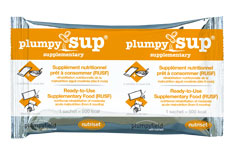Dietary supplement: the little bag that can save Somalia
 The World Food Programme has begun to send 100 tonnes of a revolutionary dietary supplement to Mogadishu. A product manufactured by the French.
The World Food Programme has begun to send 100 tonnes of a revolutionary dietary supplement to Mogadishu. A product manufactured by the French.
It is a small orange bag and money that could be easily mistaken for a drug. We could also not totally wrong. The difference is that this bag is essentially a food, and that alone can feed a child for nearly 24 hours. The Plumpy'Sup, it is called, is the new product of choice for aid agencies when they intervene in situations of famine. "We used more and more," says Marie Wentzell, spokesman for the World Food Programme, WFP, which is precisely to launch an unprecedented airlift flights to Somalia. Aboard the first aircraft, which took off Wednesday in Nairobi in neighboring Kenya, ten tons of Plumpy'Sup. "One hundred tons are ready to be shipped," said the spokesman for the WFP. "What feed 35,000 children for a month," she adds.
What is this miracle product? Technically, it is a paste, peanut-based, presented as a "nutritional supplement ready to eat." In reality it is a concentrate of micronutrients and vitamins, a small bag containing 500 grams of 92 kcal. A "medical food", as defined by the "father" of Plumpy'Sup, Michel Lescanne. This former engineer food has left everything behind in 1986 to found Nutriset, a family business based in Normandy, and dedicated to the "nutrition course." Looking to the humanitarian, he decided to develop products that could help people affected by famine. In 1996, landed Plumpy'Nut, an innovation designed to deal with acute malnutrition of young children (under five). A world first, dubbed by the WHO. Will result in a range of products including Plumpy'Sup dedicated to malnutrition "moderate", what is even the case of children who flock to the Somali refugee camps.
Specifically, at a rate of one packet per day, a child with severe food shortages is "bailed out" in three weeks, says Michel Lescanne. A promise confirmed by the World Food Programme, already widely used product in Haiti, after the earthquake of January 2010. But the strategy Nutriset does not stop there. Norman Company, which employs 140 people in Rouen, decided to open its patents to a network of local producers. Thus, Addis Ababa independently produced nearly 80% of the needs of Ethiopia Plumpy'Sup. "This is our unique strategy: find the maximum production, and devote the French plant to urgent requests, as in Somalia or Haiti," said the founder of Nutriset. The company says can produce 250 tons of food a miracle a day, if a disaster requires. In the key, a real bargain for NGOs, and a turnover of 100 million Euros for the company. Comfortable, but far from the billion posted by the giants of the pharmaceutical industry. Humanitarian human face.